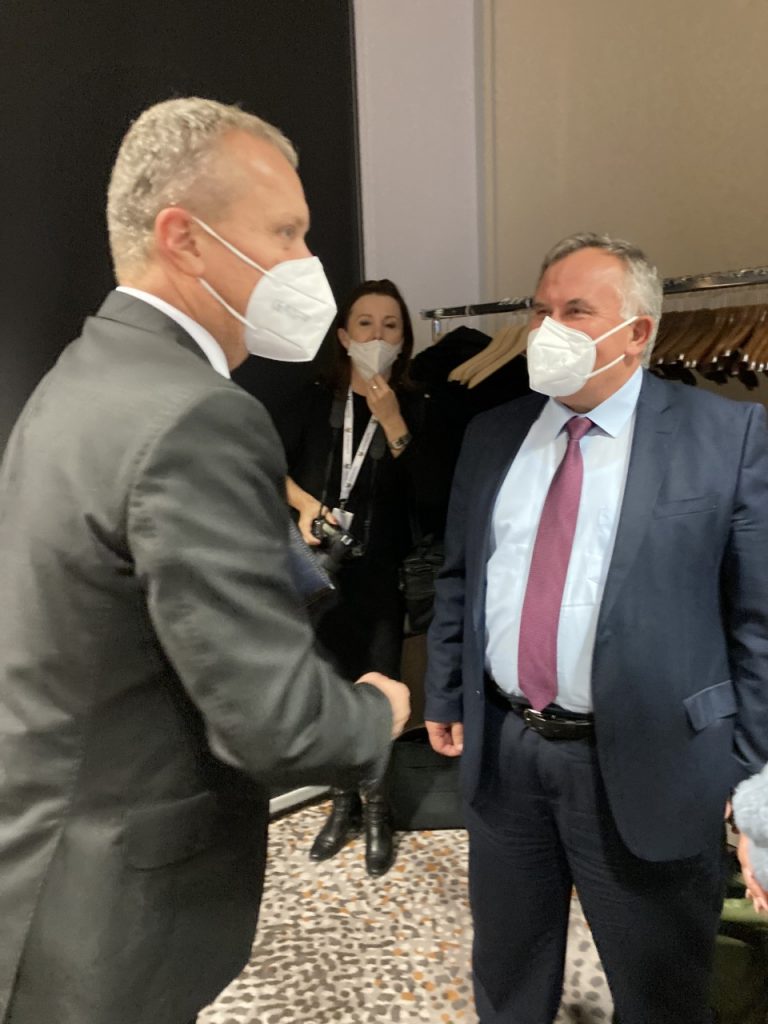Tax and financial experts from North Macedonia discussed local tax system improvements with their Slovak counterparts during a three-day visit to Bratislava in November.
Varied representatives gathered to present good practice examples to ten participants from North Macedonia. They included members from the Ministry of Finance of the Slovak Republic (MF SR), Association of Towns and Communities of Slovakia (ZMOS), Supreme Audit Office of the Slovak Republic (SAO SR), and the DEUS Association (Datacentre for Electronization of the Local Self-government of the Slovak Republic, an organization founded by ZMOS and MF SR.) Topics ranged from issues relating to property tax in Slovakia and North Macedonia, and financial relationships between the central government and the local government, to the audit of local government financial statements (including risk management and risk assessment).
Prof. Borce Trenovski, a UNDP expert from the Faculty of Economy at St. Cyril Methodius University in Skopje, is grateful for Slovakia’s helping hand. ”Many of changes in legislation and improvements that North Macedonia intends to implement (on the road to the EU), have already been implemented by our colleagues in Slovakia. In this regard, it is especially useful to identify gaps, bottlenecks and challenges faced by our Slovak counterparts in their implementation.” Slovakia was the first country to provide North Macedonia with know-how and experience regarding property tax administration and collection. Local taxes and fees were broadly discussed during a study visit to Slovakia two years ago. It was organized within the Slovak Ministry of Finance (MF SR) and UNDP’s Public Finance for Development programme.
“It was also useful to see the two applications; one developed by the Supreme Audit Office of the Slovak Republic in which data from LSGU audit reports are presented in an interactive way, and the other DCOM system provided by DEUS who offers different types of services,” said Katerina Chaloska Aleksovska, one of the Macedonian guests. DCOM’s goal is to create the Municipality Data Centre (MDC, Slovak version DCOM) to make the E-services available for municipalities so they will be able to deliver them to citizens and businesses.
Insight from Supreme Audit Institutions

At the study visit, the Auditor General of the State Audit Office of North Macedonia, Mr. Maksim Acevski, met with his Slovak counterpart, Mr. Ľubomír Andrassy, Vice-President of the Supreme Audit Office of the Slovak Republic.
The SAO of North Macedonia is continuously involved in different initiatives of SAIs at an international level. Within the EUROSAI Task Force on Municipality Audit, it is currently coordinating the cooperative audit on the topic titled, “Municipalities’ own revenues for providing quality services to citizens during pandemic,” where the SAO of the Slovak Republic is an active participant. Where does Mr. Acevski see room for cooperation between the two SAOs? “Auditing is a complex subject matter and there are many topics and areas where both SAIs can share their experience, e.g. digitalization of operations for improved audit planning, reporting/writing audit reports and their visualization, audit quality control and audit quality assurance, and transparency and accountability of SAI towards stakeholders.” He added that to watch over public funds and contribute to improved management thereof, SAIs must ensure continuous quality of operations.
Cooperation is a two-way road
North Macedonia became a Public Finance for Development programme partner country in 2018. The programme enables the sharing of Slovak knowledge and experience in public finance management with partners. The cooperation with the Slovak Republic, through several study visits and realization of joint research and policy documents with Slovak experts, provided North Macedonia with several suggestions for improvements. Prof. Trenovski believes Slovak experts can get inspiration from their Macedonian counterparts in many areas. Examples include digital tools for “open finance” and “e-liabilities”, the SMART public finances system that North Macedonia is planning to implement in the coming period in order to increase efficiency in spending public money, or the introduction of a performance system in order to stimulate efficiency in local finances. To strengthen information exchange between the two countries, he suggests, “It is necessary to establish a permanent working body that will continuously exchange specific information on experience, changes in legislation, good practices, and reforms planned. Further, this will enable concrete joint work on certain challenges in the local tax systems and determination of joint solutions, which in addition to improving the local tax system, will affect the joint capacities building, mutual cooperation, and partnership.”

